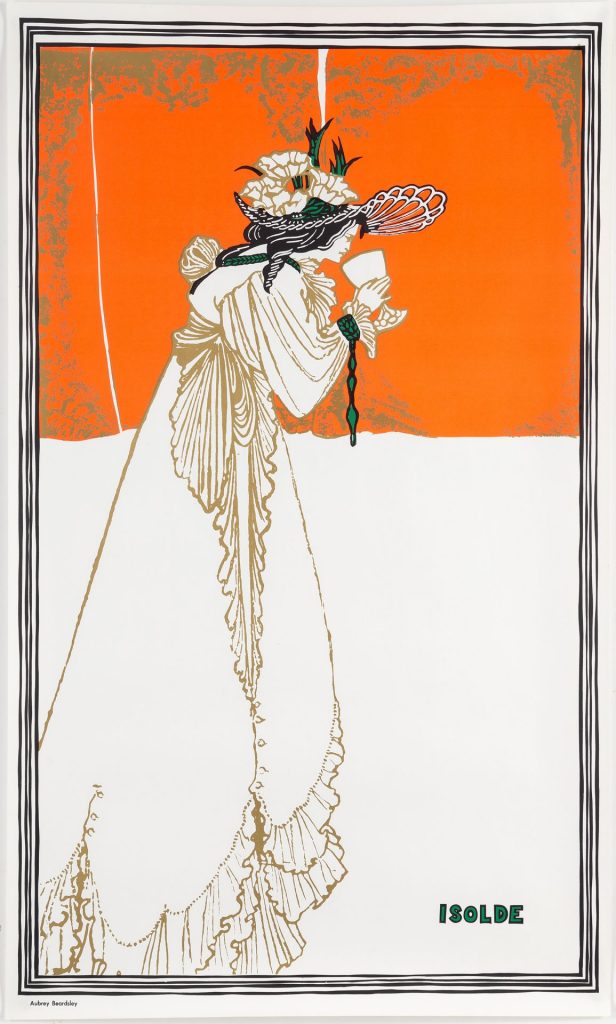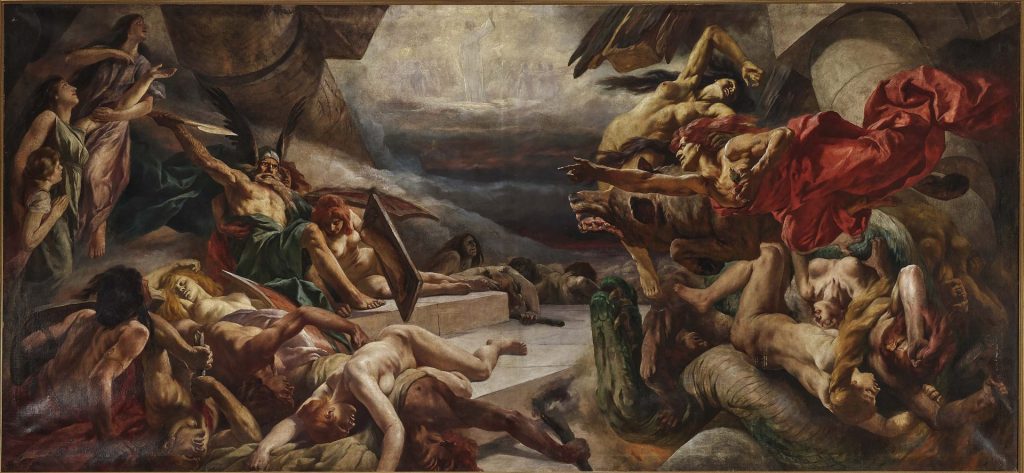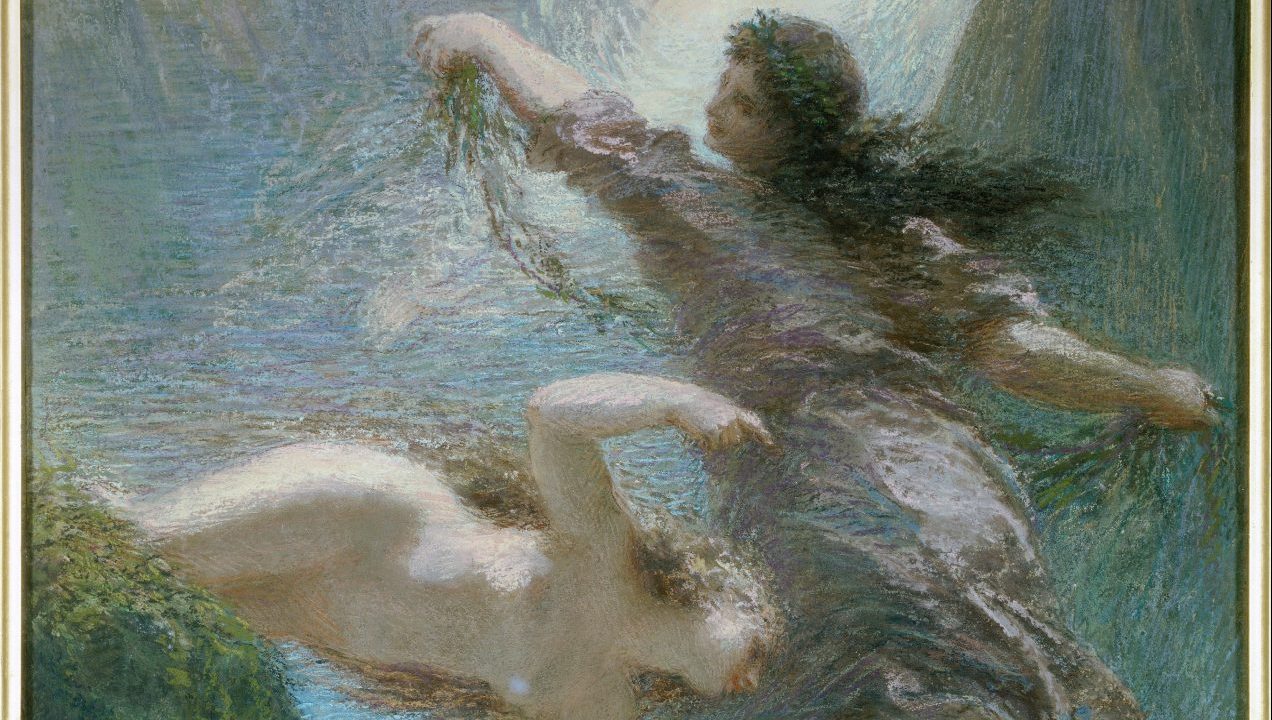Barrie Kosky’s new production of the The Ring of the Nibelung, whose first instalment The Rhinegold opened at Covent Garden in September, gives one answer. It opens in total silence, with a 92-year-old woman walking hunched and naked across the stage. This is Erda, the earth mother of Norse mythology, and what’s about to happen is her dream.
Kosky has chosen to stage The Ring as a human drama only, turning its giants into Japanese gangsters, its gods into polo-playing aristocrats and its Rhinemaidens into a Goth girl band. The theme is the human despoliation of the planet: the gold stolen from the Rhine takes liquid form, and oozes like industrial sludge from the carcass of a dead tree.
Which leaves only the problem of Alberich, the dwarf who steals it. In Wagner’s original, Alberich is unmistakeably an antisemitic caricature: greedy, lascivious, so ruthless in his desire to amass wealth and control the world that he renounces love. He embodies the commercialism that Wagner, and the left-wing intellectual circle he was part of in the 1840s, associated with “Jewishness”: the opposite of their ideal of “pure humanity”.


How do you fit that into a production slated for the mid-2020s? Kosky, who is himself Jewish, does so by making Alberich simply human. He is a hapless artisan whose love of bright things transmutes into hatred and vengeance when confronted with injustice. Kosky turns the drama into a conversation piece where all the “races” of Norse mythology confront each other on the same, level, human playing field.
It worked, for me, and I came away from the Royal Opera House elated and inspired. That was on September 29.
Eight days later, I woke up to pictures of the Hamas terror attack on Israel, which prime minister Rishi Sunak rightly described as a pogrom. It had all the characteristics of a 19th-century mob attack on Jews: rape, torture, infanticide, indiscriminate murder, with the videos of the gleeful perpetrators going viral and whispered commentary across the internet to the effect that the victims “had it coming”.
So the question is posed anew. After all attempts to expiate the antisemitism in Wagner’s work; after all the confrontational productions of the past 20 years; after all attempts to separate the beauty of the music from the vileness of its guiding idea, how can we still stage Wagner?
To understand the challenge, we need to recap the story of the Ring Cycle. In The Rhinegold, Wotan kidnaps Alberich in order to extort the gold for himself. But his business contract with two giants means it is they who walk away with the gold and – because it is cursed – one immediately kills the other.
In The Valkyrie, Wotan has fathered a race of humans who can – because of their heroic nature – win back the gold without breaking the sacred contract. He has also fathered a race of Valkyries, whose job is to bring fallen warriors to protect him from the surviving giant (who has turned himself into a dragon). This goes wrong when Brünnhilde, the chief Valkyrie, disobeys.
In Siegfried, Wotan’s human grandson is being nurtured by Mime, Alberich’s dwarf brother. Siegfried recognises his own human nature, admits his hatred of the dwarf, kills Mime, kills the dragon, gets the gold and weds Brünnhilde.
Finally, in Twilight of the Gods, everything goes wrong. Siegfried is drugged, persuaded that he hates Brünnhilde and then gets murdered by a family of half-dwarves fathered by Alberich. In the final scene, Brünnhilde throws Siegfried’s gold ring into the Rhine, declares an end to the world of the gods and jumps on to a burning funeral pyre.
Though the allegory is multi-layered, there is no doubt as to the meaning of the Ring: it is the whole of human history, past and future, depicted through 15 hours of the most sublime music ever written.
At the start there is only nature – the Rhine depicted by an orchestra bubbling around a single chord for several minutes. Wotan’s contract with the giants – which the scholar Eric Nelson shows to be coded as a “Jewish pedlar’s bargain” – introduces both history and destiny into the world. The gods are destroyed by egotism, avarice and commercial legality.
Siegfried – the “pure human” hero acting on instinct alone – brings about both the gods’ downfall and his own. Brünnhilde, by renouncing the will to live, brings about “the blessed end of all things eternal”. The forces of progress, human desire, and capitalism result in a battle between humanity and nature, and nature wins.
So it’s entirely possible to stage this story in defiance of the composer’s antisemitism. In fact, for its fans – myself included – it comes close to being the greatest ever telling of a story in the history of art. But we have to acknowledge that, for Wagner – as for the early Marx – Jewishness was shorthand for all the negative qualities that lead humanity to disaster.
In 2013, in the BBC Radio 4 series Wagner: Power, Sex and Revolution, I argued that it is only possible to focus on the beauty in these works after acknowledging the composer’s racism, the historic use to which it was put, and by foregrounding what is universal and humanistic. Stefan Herheim’s production in Berlin last year took that challenge head-on: at the start of his The Valkyrie, the god Wotan emerges from the orchestra pit carrying the musical score, dressed like Wagner himself, and starts “playing” the overture on a grand piano. His Alberich is an evil clown, whose qualities simply mimic the flaws of the other characters. The stage is thronged with refugees; their abandoned suitcases, piled up like those found in Auschwitz at its liberation, form a backdrop to the final scene.
Herheim’s Ring, which will play in Berlin three times next year, comes close to being the perfect dramaturgical solution to the antisemitism problem. Kosky’s own 2017 staging of Wagner’s The Mastersingers of Nuremberg, its ending set in the austere courtroom of the Nuremberg Trials, also came close.
But where do we go after that? We are surrounded once again by genocidal thought and action. Russia’s state media peddles nightly fantasies about rounding up Ukrainians into camps from which they do not emerge; 200,000 Armenians have been forcibly expelled from Nagorno-Karabakh; in Darfur, Myanmar, Xinjiang there are actions arguably conforming to the 1948 Convention’s definition of genocide. Hamas’s atrocity against Israel has reintroduced the mass killing of Jews into the repertoire of the 21st century, and triggered dark fantasies of revenge on the Israeli far right.
In 2015 the renowned baritone Bernd Weikl published a diatribe against all progressive stagings of Wagner. He claimed there is nothing antisemitic about the work, and that productions that acknowledge its problems are a form of cancellation of the work itself. He even tried to get producers at one opera house criminally prosecuted. Around the same time, the Alternativ für Deutschland, the German far right party, published a manifesto calling for theatre producers to return to “classical” stagings that produce a “positive view of our homeland”.
But this debate, about producers’ right to confront Wagner’s relationship to Nazism, now seems like a controversy from an age of innocence. After Putin’s destruction of Mariupol, and after Hamas’s murder spree across the kibbutzes of southern Israel, we have to squarely confront the possibility that, sometime in the next two decades, a Ring Cycle might once again be performed alongside actual genocide. The AfD, whose folksy manifesto people laughed at in 2016, is now polling in the mid-20% range for the next German election.
In our age, just as there is no innocent Wagner. Anyone trying to produce Wagner in “pure” form – as Weikl demanded – with the racist problematics unacknowledged, is themself making a reactionary political statement.
Because the danger is not only neo-fascism. We are seeing the recrudescence of left-wing antisemitism. The dark corners of the British far left echo with the accusation that Labour’s antisemitism scandal was “a scam”. Demonstrators mobilised in solidarity with the Palestinians of Gaza are being told by self-appointed anti-imperialists that they were “exhilarated” when they saw the Gaza fence go down; how the attack was “beautiful”; how the use of the word pogrom to describe it is, itself, colonialist. And as Paul Lawrence Rose showed, in his book Wagner: Race and Revolution, Wagner and his co-thinkers in the 1840s were the original left antisemites: systematically conflating Jewishness with the ethos of capitalism.
But we cannot cancel Wagner.
As a thought experiment imagine if, as in Israel since 1938, we placed an unofficial ban on live performances throughout the western world. You could still study the music, play it through your headphones, maybe with the odd concert performance of the symphonic bits – but you could not see it live? Not at the Met. Not at Covent Garden. Not at Bayreuth. For certain, that ardent band of conductors and opera divas who support Vladimir Putin would keep the tradition alive in Moscow and St Petersburg.
But there would be a Wagner-sized hole in the classical music repertoire of the west and nothing else in that repertoire would make sense. Because musical modernity revolves around Wagner’s legacy.
The Ring is a landmark of western art; Wagner’s three late operas – Meistersinger, Tristan and Isolde and Parsifal – form a bridge to the 20th century. In them, the use of musical themes as a psychological subtext to the action is achieved at a scale not seen before or since. You could perform Tristan without music at all, reading only the words, and still send people out of the theatre as its first performances did: in a state of hysteria over its “moral anarchy”.
The works are so huge that, even for expert conductors, each demands a lifetime’s study. As a mere enthusiast, who began studying Wagner at university in 1978, I know that 45 years on I am not even one-quarter of the way to understanding them.
So we are stuck with Wagner. Almost uniquely in modern theatre, these are works where every new production is obliged to be a commentary on the last, and on the world around it. And if that world slides towards even bloodier conflicts, and more lurid fantasies of ethnic supremacy, the work will get harder. But it cannot stop.
Paul Mason’s Wagner: Power, Sex and Revolution can be heard at BBC Sounds



